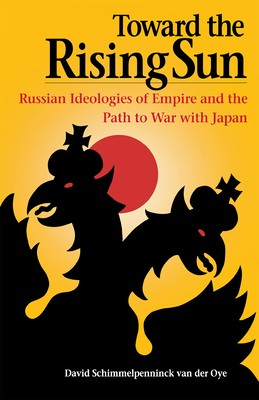
- We will send in 10–14 business days.
- Author: David Schimmelpenninck Van Der Oye
- Publisher: Northern Illinois University Press
- ISBN-10: 0875802761
- ISBN-13: 9780875802763
- Format: 16.3 x 23.8 x 2.8 cm, hardcover
- Language: English
- SAVE -10% with code: EXTRA
Reviews
Description
What drove Russia to its disastrous war with Japan in 1904? Was it corruption at the highest levels, ignorance of Japan's naval capabilities, or overconfidence in Russia's own military power? In this highly original study, Schimmelpenninck argues that the conflict came about because of St. Petersburg's erratic and confused diplomacy. The key to understanding tsarist involvement in East Asia, he explains, is to examine the ideas of those who competed to impose their visions of destiny on the Pacific.
Drawing from previously inaccessible archives in Moscow and St. Petersburg, Schimmelpenninck presents a new approach to understanding the causes of the Russo-Japanese War. He begins with lively sketches of Tsar Nicholas II and the four leading proponents of expansion in East Asia--famous Inner Asia explorer Nikolai Przhevalskii, Sinophile newspaper publisher Prince Esper Ukhtomskii, Finance Minister Sergei Witte, and War Minister Aleksei Kuropatkin. In each case, ideologies of empire are explored in the context of both European and Russian thought.
Toward the Rising Sun goes on to reinterpret tsarist prewar democracy--from Russia's involvement in East Asia during the 1890s to Admiral Togo's surprise attack at Port Arthur in 1904--using extensive archival sources. Throughout, Schimmelpenninck demonstrates the ties between ideas and policy. Interweaving intellectual and cultural history with international perspectives, he addresses an important aspect of Russian national identity at a crucial point in history and helps to elucidate the struggle between East and West that continues in Russia today.
EXTRA 10 % discount with code: EXTRA
The promotion ends in 21d.02:20:51
The discount code is valid when purchasing from 10 €. Discounts do not stack.
- Author: David Schimmelpenninck Van Der Oye
- Publisher: Northern Illinois University Press
- ISBN-10: 0875802761
- ISBN-13: 9780875802763
- Format: 16.3 x 23.8 x 2.8 cm, hardcover
- Language: English English
What drove Russia to its disastrous war with Japan in 1904? Was it corruption at the highest levels, ignorance of Japan's naval capabilities, or overconfidence in Russia's own military power? In this highly original study, Schimmelpenninck argues that the conflict came about because of St. Petersburg's erratic and confused diplomacy. The key to understanding tsarist involvement in East Asia, he explains, is to examine the ideas of those who competed to impose their visions of destiny on the Pacific.
Drawing from previously inaccessible archives in Moscow and St. Petersburg, Schimmelpenninck presents a new approach to understanding the causes of the Russo-Japanese War. He begins with lively sketches of Tsar Nicholas II and the four leading proponents of expansion in East Asia--famous Inner Asia explorer Nikolai Przhevalskii, Sinophile newspaper publisher Prince Esper Ukhtomskii, Finance Minister Sergei Witte, and War Minister Aleksei Kuropatkin. In each case, ideologies of empire are explored in the context of both European and Russian thought.
Toward the Rising Sun goes on to reinterpret tsarist prewar democracy--from Russia's involvement in East Asia during the 1890s to Admiral Togo's surprise attack at Port Arthur in 1904--using extensive archival sources. Throughout, Schimmelpenninck demonstrates the ties between ideas and policy. Interweaving intellectual and cultural history with international perspectives, he addresses an important aspect of Russian national identity at a crucial point in history and helps to elucidate the struggle between East and West that continues in Russia today.


Reviews